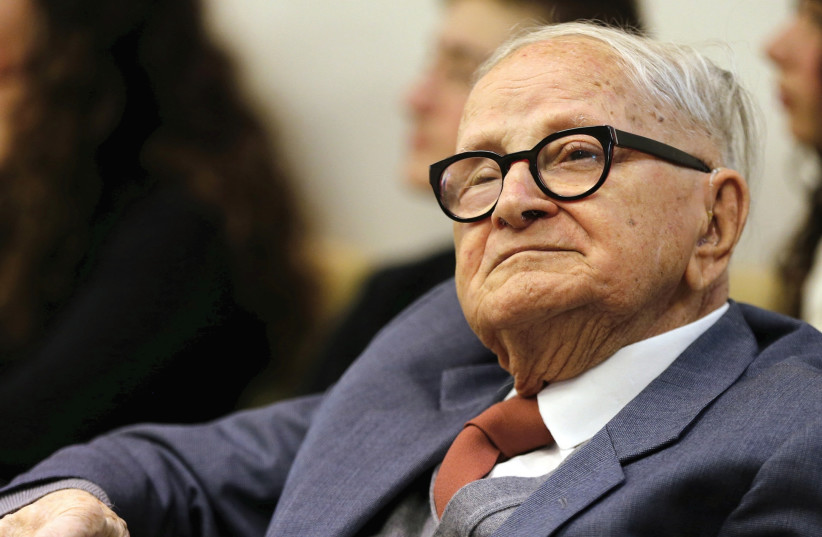The late Rafi Eitan was – as the title Capturing Eichmann: The Memoir of a Mossad Spymaster suggests – an intelligence operative, a maverick with a finger in many pies.
Working on this account until a few days before his death in 2019, this posthumous publication relates many fascinating episodes in his life: how he killed two German Templars who wanted to return to their farms in British-controlled Palestine after World War II; suggested to David Ben-Gurion about the stuffing of ballot boxes with fake votes during the 1955 election; and worked with SS Obersturmbannführer Otto Skorzeny, who had released Benito Mussolini from captivity in 1943 and supported the fascist Arrow Cross in Hungary. He comments that in the course of his work, he had “no hesitation about employing Nazis to ensure the security of Israel.”
Eitan’s odyssey is a mirror image of the history of the state.
His father fought in Trotsky’s Red Army, while he himself was a member of the Palmah, operating against Fawzi al-Qawuqji and participating in the Battle of Malikiya during the War of Independence. Eitan was involved in the arrests of Aharon Cohen, Kurt Sitte and Israel Beer, all accused of being engaged in Soviet espionage. He believed that the Americans were fighting “a futile war” in Vietnam and attempted to explore contacts with the Chinese leadership through the good offices of Morris Cohen, a one-time consultant to Mao’s intelligence services and representative of British companies in China. He came to know Markus Wolf, the partly Jewish head of the Stasi in Communist East Germany, and regarded president Jimmy Carter’s unwillingness to intervene in Iran to stop the ascent of Ayatollah Khomeini’s Islamists as “one of the most serious and tragic mistakes since World War II.”
His own political path took him from the Left to the Right to the Pensioners’ Party when he unexpectedly became a minister in Ehud Olmert’s government in old age.
His business activities included a vegetable drying factory, the export of tropical fish, and raising black goats and plump turkeys. He was one of the entrepreneurs whom Fidel Castro invited to Cuba after the fall of the USSR. His expertise in cultivating and exporting fruit helped to stabilize Cuba economically during the 1990s. Eitan comments in this book on “the extraordinary enthusiasm of Cuban youth... which reminded me very much of our youth after 1948.” He also had dinner with Castro, whom he describes as “a dominant presence, excellent memory and tireless curiosity.”

Eitan adds color to the capture of Adolf Eichmann in Argentina. Eichmann – “the dybbuk” – lived in a shabby home without electricity in Buenos Aires and scraped a living in the spare parts department of Mercedes-Benz. Eitan worried that Eichmann was in possession of a cyanide capsule – and, like Hermann Goering and Heinrich Himmler, would escape the hangman. Eichmann turned out instead to be very cooperative – he wanted to please whichever “master” he served.
Eitan wanted Eichmann’s presence in Israel to be kept under wraps so that the trail for Josef Mengele, “the Angel of Death,” would not suddenly grow cold – but Ben-Gurion’s instant announcement eliminated this approach. At that time, Ben-Gurion refused to reveal and recognize Eichmann’s kidnappers. This was only remedied when Eitan became a minister when they were publicly thanked at a ceremony in the Knesset.
Eitan questioned Eichmann several times when he was in Ramle prison, and he witnessed his hanging.
Eitan writes disparagingly of Yasser Arafat – and attempted to assassinate him on several occasions after 1967. In contrast to many, Eitan strongly defends Ariel Sharon’s conduct in cabinet during the debacle of Operation Peace for Galilee in 1982 and castigates figures such as Yosef Burg on the grounds that they had no military experience. He argues that the head of Maronite intelligence, Elie Hobeika, was almost certainly a Syrian agent and a key planner in “the slaughter of women, the elderly and children” in the camps of Sabra and Shatilla. He also argues that it was the Mossad’s professional responsibility to know that “the Phalange leadership had decided on the massacre.” Despite the appraisal of many commentators over the years, Eitan regards the call for Sharon’s dismissal by the Kahan Commission in 1983 as “a scandal.”
This mindset led Eitan to vehemently oppose the Oslo Accords in 1993 and to blame Yossi Beilin as its architect. In contrast, Eitan further argues that Sharon as prime minister would have evacuated isolated settlements in the West Bank. He argues that Israelis and Palestinians must go their own separate ways and that “we must leave most of Judea and Samaria unilaterally,” while retaining security control of the Jordan Valley.
As Jonathan Pollard’s handler, he is relatively silent on the affair, apart from issuing the order to ensure that Pollard did not seek refuge in the Israeli Embassy. He writes that the Americans did not stand by their commitment to release Pollard after 10 years’ imprisonment.
Eitan was undoubtedly a man for all seasons – someone who could not be pigeonholed ideologically. The statements and vignettes in this book are clearly open to checking and re-examination, but it fortifies his comment that he had “never been loyal to anyone without being critical.” A contrarian, he was his own man – and that is what makes this book enlightening reading.
Capturing Eichmann
By Rafi Eitan
Greenhill Books
352 pages; $34.95
